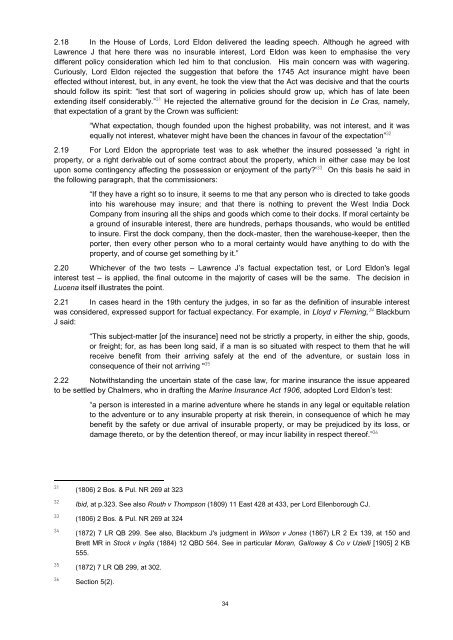Insurance Contracts CP - Law Reform Commission
Insurance Contracts CP - Law Reform Commission
Insurance Contracts CP - Law Reform Commission
You also want an ePaper? Increase the reach of your titles
YUMPU automatically turns print PDFs into web optimized ePapers that Google loves.
2.18 In the House of Lords, Lord Eldon delivered the leading speech. Although he agreed with<br />
<strong>Law</strong>rence J that here there was no insurable interest, Lord Eldon was keen to emphasise the very<br />
different policy consideration which led him to that conclusion. His main concern was with wagering.<br />
Curiously, Lord Eldon rejected the suggestion that before the 1745 Act insurance might have been<br />
effected without interest, but, in any event, he took the view that the Act was decisive and that the courts<br />
should follow its spirit: ―lest that sort of wagering in policies should grow up, which has of late been<br />
extending itself considerably.‖ 31 He rejected the alternative ground for the decision in Le Cras, namely,<br />
that expectation of a grant by the Crown was sufficient:<br />
―What expectation, though founded upon the highest probability, was not interest, and it was<br />
equally not interest, whatever might have been the chances in favour of the expectation‖ 32<br />
2.19 For Lord Eldon the appropriate test was to ask whether the insured possessed 'a right in<br />
property, or a right derivable out of some contract about the property, which in either case may be lost<br />
upon some contingency affecting the possession or enjoyment of the party?' 33 On this basis he said in<br />
the following paragraph, that the commissioners:<br />
―If they have a right so to insure, it seems to me that any person who is directed to take goods<br />
into his warehouse may insure; and that there is nothing to prevent the West India Dock<br />
Company from insuring all the ships and goods which come to their docks. If moral certainty be<br />
a ground of insurable interest, there are hundreds, perhaps thousands, who would be entitled<br />
to insure. First the dock company, then the dock-master, then the warehouse-keeper, then the<br />
porter, then every other person who to a moral certainty would have anything to do with the<br />
property, and of course get something by it.‖<br />
2.20 Whichever of the two tests – <strong>Law</strong>rence J‘s factual expectation test, or Lord Eldon's legal<br />
interest test – is applied, the final outcome in the majority of cases will be the same. The decision in<br />
Lucena itself illustrates the point.<br />
2.21 In cases heard in the 19th century the judges, in so far as the definition of insurable interest<br />
was considered, expressed support for factual expectancy. For example, in Lloyd v Fleming, 34 Blackburn<br />
J said:<br />
―This subject-matter [of the insurance] need not be strictly a property, in either the ship, goods,<br />
or freight; for, as has been long said, if a man is so situated with respect to them that he will<br />
receive benefit from their arriving safely at the end of the adventure, or sustain loss in<br />
consequence of their not arriving " 35<br />
2.22 Notwithstanding the uncertain state of the case law, for marine insurance the issue appeared<br />
to be settled by Chalmers, who in drafting the Marine <strong>Insurance</strong> Act 1906, adopted Lord Eldon‘s test:<br />
―a person is interested in a marine adventure where he stands in any legal or equitable relation<br />
to the adventure or to any insurable property at risk therein, in consequence of which he may<br />
benefit by the safety or due arrival of insurable property, or may be prejudiced by its loss, or<br />
damage thereto, or by the detention thereof, or may incur liability in respect thereof.‖ 36<br />
31<br />
32<br />
33<br />
34<br />
35<br />
36<br />
(1806) 2 Bos. & Pul. NR 269 at 323<br />
Ibid, at p.323. See also Routh v Thompson (1809) 11 East 428 at 433, per Lord Ellenborough CJ.<br />
(1806) 2 Bos. & Pul. NR 269 at 324<br />
(1872) 7 LR QB 299. See also, Blackburn J's judgment in Wilson v Jones (1867) LR 2 Ex 139, at 150 and<br />
Brett MR in Stock v Inglis (1884) 12 QBD 564. See in particular Moran, Galloway & Co v Uzielli [1905] 2 KB<br />
555.<br />
(1872) 7 LR QB 299, at 302.<br />
Section 5(2).<br />
34

















